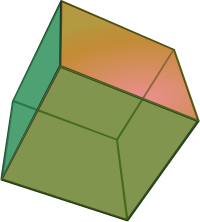cubo
Jump to navigation
Jump to search
Aragonese[edit]
Etymology[edit]
Noun[edit]
cubo m (plural cubos)
References[edit]
- Bal Palazios, Santiago (2002) “cubo”, in Dizionario breu de a luenga aragonesa, Zaragoza, →ISBN
Galician[edit]
Etymology 1[edit]
Pronunciation[edit]
Noun[edit]
cubo m (plural cubos)
- cube (shape)
Related terms[edit]
Etymology 2[edit]
Pronunciation[edit]
Noun[edit]
cubo m (plural cubos)
Related terms[edit]
References[edit]
- “cubo” in Dicionario de Dicionarios do galego medieval, SLI - ILGA 2006–2022.
- “cubo” in Xavier Varela Barreiro & Xavier Gómez Guinovart: Corpus Xelmírez - Corpus lingüístico da Galicia medieval. SLI / Grupo TALG / ILG, 2006–2018.
- “cubo” in Dicionario de Dicionarios da lingua galega, SLI - ILGA 2006–2013.
- “cubo” in Tesouro informatizado da lingua galega. Santiago: ILG.
- “cubo” in Álvarez, Rosario (coord.): Tesouro do léxico patrimonial galego e portugués, Santiago de Compostela: Instituto da Lingua Galega.
Italian[edit]
Etymology[edit]
Pronunciation[edit]
Adjective[edit]
cubo (feminine cuba, masculine plural cubi, feminine plural cube)
Noun[edit]
cubo m (plural cubi)
Derived terms[edit]
- elevare al cubo to cube in mathematics
Anagrams[edit]
Latin[edit]
Pronunciation[edit]
- (Classical) IPA(key): /ˈku.boː/, [ˈkʊboː]
- (modern Italianate Ecclesiastical) IPA(key): /ˈku.bo/, [ˈkuːbo]
Etymology 1[edit]
From Proto-Italic *kubāō, from Proto-Indo-European *ḱewb-.
Compare Welsh cysgu (“to sleep”), English hip, Albanian sup (“shoulder”), Ancient Greek κύβος (kúbos, “vertebra, hollow before the hip (in cattle)”).
Verb[edit]
cubō (present infinitive cubāre, perfect active cubuī, supine cubitum); first conjugation, no passive
- to lie down, recline
- Synonym: iaceō
- to sleep; lie asleep
- Synonyms: obdormīscō, dormiō, obdormiō, dormītō, obdormītō
- Antonyms: expergīscor, vigilō
- to recline at table (for a meal)
- to be sick, bedridden
- to incubate, be broody
Conjugation[edit]
Derived terms[edit]
Related terms[edit]
Descendants[edit]
- Friulian: covâ
- Italian: covare
- Lombard: covà
- Old French: cover
- Piedmontese: coé
- Sicilian: cuvari
- Venetian: coar
- Walloon: cover
Etymology 2[edit]
See the etymology of the corresponding lemma form.
Noun[edit]
cubō
References[edit]
- “cubo”, in Charlton T. Lewis and Charles Short (1879) A Latin Dictionary, Oxford: Clarendon Press
- “cubo”, in Charlton T. Lewis (1891) An Elementary Latin Dictionary, New York: Harper & Brothers
- cubo in Charles du Fresne du Cange’s Glossarium Mediæ et Infimæ Latinitatis (augmented edition with additions by D. P. Carpenterius, Adelungius and others, edited by Léopold Favre, 1883–1887)
- cubo in Gaffiot, Félix (1934) Dictionnaire illustré latin-français, Hachette.
- Carl Meißner, Henry William Auden (1894) Latin Phrase-Book[1], London: Macmillan and Co.
- (ambiguous) to go to bed: cubitum ire
- (ambiguous) to go to bed: cubitum ire
- Logeion DMLBS entry for cubare
Portuguese[edit]

Etymology 1[edit]
Pronunciation[edit]
Noun[edit]
cubo m (plural cubos)
- (geometry) cube (a regular polyhedron having six identical square faces)
- any object whose shape is similar to that of a cube
- (mathematics) cube (the third power of a number or mathematical expression)
Derived terms[edit]
Etymology 2[edit]
Verb[edit]
cubo
Spanish[edit]
Pronunciation[edit]
Etymology 1[edit]
From Latin cubus, from Ancient Greek κύβος (kúbos).
Noun[edit]
cubo m (plural cubos)
- (geometry) cube (a regular polyhedron having six identical square faces)
- (mathematics) cube (the third power of a number, value, term or expression)
- El cubo de 2 es 8.
- The cube of 2 is 8.
Derived terms[edit]
Related terms[edit]
Etymology 2[edit]
Noun[edit]
cubo m (plural cubos)
- (Spain, Cuba) bucket, pail (a container made of rigid material, often with a handle, used to carry liquids or small items)
Derived terms[edit]
Further reading[edit]
- “cubo”, in Diccionario de la lengua española, Vigésima tercera edición, Real Academia Española, 2014
Anagrams[edit]
Categories:
- Aragonese terms derived from Latin
- Aragonese lemmas
- Aragonese nouns
- Aragonese masculine nouns
- Galician terms derived from Latin
- Galician terms with IPA pronunciation
- Galician lemmas
- Galician nouns
- Galician countable nouns
- Galician masculine nouns
- gl:Geometry
- Italian terms derived from Latin
- Italian 2-syllable words
- Italian terms with IPA pronunciation
- Rhymes:Italian/ubo
- Rhymes:Italian/ubo/2 syllables
- Italian lemmas
- Italian adjectives
- Italian nouns
- Italian countable nouns
- Italian masculine nouns
- it:Geometry
- Latin 2-syllable words
- Latin terms with IPA pronunciation
- Latin terms derived from Proto-Indo-European
- Latin terms derived from the Proto-Indo-European root *ḱewb-
- Latin terms inherited from Proto-Italic
- Latin terms derived from Proto-Italic
- Latin lemmas
- Latin verbs
- Latin first conjugation verbs
- Latin first conjugation verbs with perfect in -u-
- Latin active-only verbs
- Latin non-lemma forms
- Latin noun forms
- Latin words in Meissner and Auden's phrasebook
- Portuguese terms derived from Latin
- Portuguese 2-syllable words
- Portuguese terms with IPA pronunciation
- Portuguese lemmas
- Portuguese nouns
- Portuguese countable nouns
- Portuguese masculine nouns
- pt:Geometry
- pt:Mathematics
- Portuguese non-lemma forms
- Portuguese verb forms
- Spanish 2-syllable words
- Spanish terms with IPA pronunciation
- Rhymes:Spanish/ubo
- Rhymes:Spanish/ubo/2 syllables
- Spanish terms derived from Latin
- Spanish terms derived from Ancient Greek
- Spanish lemmas
- Spanish nouns
- Spanish countable nouns
- Spanish masculine nouns
- es:Geometry
- es:Mathematics
- Spanish terms with usage examples
- Peninsular Spanish
- Cuban Spanish
- es:Containers
- es:Shapes


